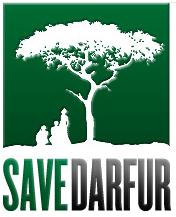Related Research Articles
The Janjaweed are an Arab nomad militia group operating in the Sahel region that operates in Sudan, particularly in Darfur and eastern Chad. They are also active in Yemen due to particpating in the Saudi Arabian–led intervention in Yemen. According to the United Nations definition, Janjaweed membership consists of Arab nomad tribes from the Sahel, the core of whom are Abbala Arabs, traditionally employed in camel herding, with significant recruitment from the Baggara.

The African Union Mission in Sudan (AMIS) was an African Union (AU) peacekeeping force operating primarily in the country's western region of Darfur to perform peacekeeping operations related to the Darfur conflict. It was founded in 2004, with a force of 150 troops. By mid-2005, its numbers were increased to about 7,000. Under United Nations Security Council Resolution 1564, AMIS was to "closely and continuously liaise and coordinate ... at all levels" its work with the United Nations Mission in Sudan (UNMIS). AMIS was the only external military force in Sudan's Darfur region until UNAMID was established. It was not able to effectively contain the violence in Darfur. A more sizable, better equipped UN peacekeeping force was originally proposed for September 2006, but due to Sudanese government opposition, it was not implemented at that time. AMIS' mandate was extended repeatedly throughout 2006, while the situation in Darfur continued to escalate, until AMIS was replaced by UNAMID on 31 December 2007.

United Nations Security Council Resolution 1564, adopted on 18 September 2004, after recalling resolutions 1502 (2003), 1547 (2004) and 1556 (2004), the Council threatened the imposition of sanctions against Sudan if it failed to comply with its obligations on Darfur, and an international inquiry was established to investigate violations of human rights in the region.

The War in Darfur, also nicknamed the Land Cruiser War, was a major armed conflict in the Darfur region of Sudan that began in February 2003 when the Sudan Liberation Movement (SLM) and the Justice and Equality Movement (JEM) rebel groups began fighting against the government of Sudan, which they accused of oppressing Darfur's non-Arab population. The government responded to attacks by carrying out a campaign of ethnic cleansing against Darfur's non-Arabs. This resulted in the death of hundreds of thousands of civilians and the indictment of Sudan's president, Omar al-Bashir, for genocide, war crimes, and crimes against humanity by the International Criminal Court.

The Save Darfur Coalition was an advocacy group that attempted "to raise public awareness and mobilize a massive response to the atrocities in Sudan's western region of Darfur." Headquartered in Washington, D.C., it was a coalition of more than 190 religious, political, and human rights organizations organized to campaign for a response to the atrocities of the War in Darfur, which culminated in a humanitarian crisis. By 2013, reports indicated that the conflict had claimed approximately 300,000 lives and had displaced over 2.5 million people.

This is the bibliography and reference section for the Darfur conflict series. External links to reports, news articles and other sources of information may also be found below.

While there is a consensus in the international community that ethnic groups have been targeted in Darfur and that crimes against humanity have therefore occurred, there has been debate in some quarters about whether genocide has taken place there. In May 2006, the International Commission of Inquiry on Darfur organized by United Nations "concluded that the Government of the Sudan has not pursued a policy of genocide ... [though] international offences such as the crimes against humanity and war crimes that have been committed in Darfur may be more serious and heinous than genocide." Eric Reeves, a researcher and frequent commentator on Darfur, has questioned the methodology of the commission's report.

Throughout its history, Darfur has been the home to several cultures and kingdoms, such as the Daju and Tunjur kingdoms. The recorded history of Darfur begins in the seventeenth century, with the foundation of the Fur Sultanate by the Keira dynasty. The Sultanate of Darfur was initially destroyed in 1874 by the Khedivate of Egypt. In 1899, the government of Anglo-Egyptian Sudan recognized Ali Dinar as the Sultan of Darfur, in exchange for an annual tribute of 500 pound sterling. This lasted until Darfur was formally annexed in 1916. The region remained underdeveloped through the period of colonial rule and after independence in 1956. The majority of national resources were directed toward the riverine Arabs clustered along the Nile near Khartoum. This pattern of structural inequality and overly underdevelopment resulted in increasing restiveness among Darfuris. The influence of regional geopolitics and war by proxy, coupled with economic hardship and environmental degradation, from soon after independence led to sporadic armed resistance from the mid-1980s. The continued violence culminated in an armed resistance movement around 2003.

The Devil Came on Horseback is a documentary film by Ricki Stern and Anne Sundberg illustrating the continuing Darfur Conflict in Sudan. Based on the book by former U.S. Marine Captain Brian Steidle and his experiences while working for the African Union. The film asks viewers to become educated about the ongoing genocide in Darfur and laments the failure of the US and others to end the crisis.
Musa Hilal is a Sudanese Arab tribal chief and militia leader and adviser to the Sudanese Minister of Internal Affairs. His Um Jalul clan exercised tribal leadership of the Arab Mahamid tribe in Darfur. The Mahamid are part of a larger confederation of camel-herding (Abbala) tribes of the Northern Rizeigat. Musa is the leader of the Janjaweed militia, which was responsible for a massive military campaign against civilians in Darfur in 2003, as part of a counterinsurgency effort against Darfur rebel groups. On 21 January 2008, the Federal Government of Sudan announced the nomination of Musa Hilal as the chief advisor of the Ministry of Federal Affairs in Sudan. This position allows Mr. Musa to coordinate with regional leaders surrounding Darfur, as well as with Arab tribal groups, on the relations of the military regime.
The United Nations Peacekeeping efforts began in 1948. Its first activity was in the Middle East to observe and maintain the ceasefire during the 1948 Arab–Israeli War. Since then, United Nations peacekeepers have taken part in a total of 72 missions around the globe, 12 of which continue today. The peacekeeping force as a whole received the Nobel Peace Prize in 1988.
The International Commission of Inquiry on Darfur was established pursuant to United Nations Security Council Resolution 1564 (2004), adopted on 18 September 2004. The resolution, passed under Chapter VII of the United Nations Charter, urged the Secretary-General to set up an international commission to investigate human rights violations committed in Darfur. The following month, the Secretary-General appointed a five-member panel of highly regarded legal experts: chairperson Antonio Cassese, Mohammed Fayek, Hina Jilani, Dumisa Ntsebeza and Thérèse Striggner Scott.

In May 2008, the Justice and Equality Movement (JEM), a Darfur ethnic minority rebel group, undertook a raid against the Sudanese government in the cities of Omdurman and Khartoum.
Jane I. Wells is a documentary filmmaker and activist whose films focus on global human rights and social justice issues. She has produced over 40 short films including the award-winning shorts I'm a Victim, Not a Criminal (2010), Lost Hope (2012) and Native Silence (2013). She is also a producer of the feature documentary films The Devil Came on Horseback (2007), Tricked (2013), A Different American Dream (2016), and Lost in Lebanon (2017).
United Nations Security Council Resolution 1935, adopted unanimously on July 30, 2010, after reaffirming all previous resolutions and statements on the situation in Sudan, the Council extended the mandate of the African Union – United Nations Hybrid Operation in Darfur (UNAMID) for a further 12 months until July 31, 2011 and demanded an end to fighting and attacks on United Nations personnel and civilians.

United Nations Security Council resolution 1556, adopted on 30 July 2004, after recalling resolutions 1502 (2003) and 1547 (2004) on the situation in Sudan, the council demanded that the Sudanese government disarm the Janjaweed militia and bring to justice those who had committed violations of human rights and international humanitarian law in Darfur.

Rear Admiral Craig Eugene Steidle, USN, Ret., served as the first associate administrator of the Office of Exploration Systems at NASA, an organization formed to implement NASA's human exploration of the solar system as announced in the Vision for Space Exploration. Admiral Steidle also served as program manager of the Joint Strike Fighter Program. He is currently serving as a distinguished visiting professor in Aerospace Engineering at the U.S. Naval Academy.
Throughout the ongoing Darfur genocide in the Darfur war there has been a systematic campaign of rape, which has been used as a weapon of war, in the ethnic cleansing of black Africans from the region. The majority of rapes have been carried out by the Sudanese government forces and the Janjaweed paramilitary groups. The actions of the Janjaweed have been described as genocidal rape, with not just women, but children also being raped, as well as babies being bludgeoned to death and the sexual mutilation of victims being commonplace.
3 Generations is a non-profit documentary film production company based in New York City.

The Darfur genocide was the systematic killing of ethnic Darfuri people during the War in Darfur. The genocide, which was carried out against the Fur, Masalit and Zaghawa ethnic groups, led the International Criminal Court (ICC) to indict several people for crimes against humanity, rape, forced transfer and torture. An estimated 200,000 people were killed between 2003 and 2005.
References
This article includes a list of general references, but it lacks sufficient corresponding inline citations .(February 2008) |
- ↑ Gretchen Steidle Wallace; Brian Steidle (2007). The Devil Came on Horseback: Bearing Witness to the Genocide in Darfur . New York: PublicAffairs. ISBN 978-1-58648-474-3.
{{cite book}}: CS1 maint: multiple names: authors list (link) - ↑ "A Global Review of Human Rights: Examining the State Department's 2004 Annual Report". United States House Committee on Foreign Affairs. 2005-03-17. Archived from the original on 2009-01-30. Retrieved 2009-02-01.
- ↑ Brian Steidle (2005-03-20). "In Darfur, My Camera Was Not Nearly Enough". The Washington Post . Retrieved 2007-11-12.
- ↑ "The Devil Came on Horseback (2007) - IMDb". IMDb .